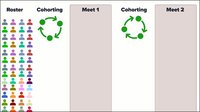Student (and teacher) mental health and wellbeing is a subject that has come to dominate education discussions. And for good reason. Wellbeing is a state that is currently elusive for both students and teachers. And with the burgeoning problems in student and teacher mental health, the need for understanding, and indeed solutions, has never been greater.
According to an article by Derek Thompson in the Atlantic, “The United States is experiencing an extreme teenage mental-health crisis. From 2009 to 2021, the share of American high-school students who say they feel “persistent feelings of sadness or hopelessness” rose from 26 percent to 44 percent, according to a new CDC study. This is the highest level of teenage sadness ever recorded.”
Among teachers, the incidence of stress and burnout is staggering. A recent survey by the RAND Corporation finds a notable increase (almost 50 percent) in the share of teachers who say they might leave the profession. In addition to concerns about mass departures, stress hinders the effectiveness of those who remain in the profession. Protecting and maintaining a robust workforce of effective teachers necessitates helping teachers in developing the tools and skills for managing workplace stress.”
The C-Factor: The cognitive impact of mental health issues
We know that stress impairs learning, but what is still often underappreciated is the degree to which mental health and cognition are connected.
The latest research is showing that mental health problems of all kinds exact a cognitive price. In a comprehensive meta-analysis of 97 studies across all of the mental health conditions defined in the Diagnostic and Statistical Manual of Mental Disorders (29 disorders), the association with cognitive dysfunction, a previously underappreciated effect, extended from simple conditions like “worry” to more severe conditions such as major depression. The study was published in Clinical Psychology Review in June 2021 and is based on data from over 200,000 individuals. The research team coined the term “C-Factor” to refer to the negative cognitive impact of a wide range of mental health issues.
The C-Factor appeared in the studies as poorer performance on cognitive tests or as a reduction in cognitive skills like attention and memory.
As Amital Abramovitch, the lead researcher on the study, explains, “We found that both diagnosable mental disorders, as well as some common symptoms such as anxiety and worry, carry a so-called ‘cognitive price.’ We termed this phenomenon ‘The C-Factor’ – short for cognitive dysfunction. Our analysis suggests that it can be found across disorders and that it constitutes an integral part of poorer mental health.”
The effect of the C-Factor appears to be present even when an individual’s mental condition is not severe enough to lead to a diagnosis. For example, many people have depressive symptoms without meeting the criteria for major depressive disorder. Diminished cognitive functioning often accompanies these symptoms. One of the reasons this is so important is that while only about 20 percent of Americans will meet the criteria for major depression, almost two thirds will experience meaningful symptoms of depression, and therefore the C-Factor, at some point in their lives. This does not mean that deficits in cognitive skills cause these diseases and disorders. But what it does suggest is that these diseases often result in or are accompanied by lowered cognitive functioning.
It turns out that every mental health ailment you can think of exacts a cognitive price – that is, people with depression and schizophrenia and PTSD and addictions and sleep disorders are typically saddled with reduced cognitive functioning. Even some medical treatments, like chemotherapy, are known to negatively impact cognitive functioning.
The other thing to understand is that cognitive effects can persist even after the mental health issue has been addressed or treated. So it’s not simply a matter of waiting to get over the stress and then returning to cognitive functioning and learning as normal. Just as mental health issues must absolutely be addressed, it is now becoming clear that the longer-term cognitive effects of those issues must also be addressed.
When learning itself is stressful
As the research continues to surface, the connection between cognition and wellbeing is undeniable. And what’s more, this is a two-way street. Stress impairs learning, and difficulty with learning is known to cause stress and anxiety. When students are depressed, every assignment they’re asked to do can seem overwhelming, and with reduced cognitive capacity, it is even worse.
In The End of Average, author Todd Rose explains that each individual brings strengths and weaknesses to every academic experience. If a student has strong perceptual skills and weak memory skills, his or her experiences will be very different from a student with weak perceptual skills and strong memory skills. The surface performance could look very similar, but it may not be obvious why because those underlying skills are difficult to evaluate without an assessment that specifically targets them.
Students with weaknesses in visual processing, for example, may not “see” what they are meant to see on the screen any more than on the whiteboard at school. Students with auditory processing issues may not take in any more of the auditory inputs that are being delivered to them than if the audio feed were garbled. Students with weak attention and/or working memory will only get fragments of the learning experience, whether in a classroom or online. These students aren’t getting the same access to the learning experience. They never really have a chance because the processes they need to learn are underdeveloped.
Learning experiences are unpredictable for students with uneven underlying strengths and weaknesses. And that unpredictability can make learning more stressful than for a student with more even skills.
When a student has strong skills in some areas and weaknesses in other areas and isn’t aware of them, some learning experiences will be easy and some will be difficult, but the student usually can’t predict which is which. Inexplicably, some things will be easy, and others will be tough. That tends to cause an enormous amount of stress for the student.
Remediating the C-Factor
If we are only just now recognizing the extent of the C-Factor, then it’s likely that we have also not recognized the need to remediate cognitive skills. And in fact, most of the solutions that have been offered and implemented post-pandemic have treated the cognitive gap as an instructional gap. The response to declining academic performance has been more or different instruction – high-dosage tutoring or pivoting to the science of reading, for example. However, if the C-Factor is at the root of the concerning trends, then the response may be causing more stress, for both students and teachers, rather than less, and exacerbating rather than remediating the real culprit, the C-Factor. What then would it look like to actually remediate the C-Factor?
In an issue brief presented by the Kennedy Forum entitled Fixing Behavioral Health Care in America: Promoting Brain Health and Brain Fitness: A National Call for Action, researchers said, “Today we know that without interventions that directly address a child’s ability to learn and function in society, our current academic paradigm and process will continue to be less than effective. Neuroscience shows that brain fitness interventions can build higher-order processing skills, promote emotional resilience, and mitigate stress. These interventions interrupt and ameliorate many of the underlying neuro-developmental lags in children caused by the environmental stressors that thwart learning. Brain health and fitness interventions implemented across American education will benefit our nation’s children now and into the future and help close the academic achievement gap.
“Research over the past two decades illuminates the powerful opportunities that simple, targeted, effective brain fitness interventions offer. On the neuro-cognitive level, these interventions can shift the intrinsic dispositions, abilities, and capacities of children to help them cultivate the cognitive capacity, attention, and self-regulation needed to succeed both academically and in life.”
What is a brain fitness intervention? Simply stated, it is a cognitive training program hat improves cognitive functioning. It strengthens cognitive processes and remediates them to previous levels of functioning, to the level of a typically developing students, and often beyond. Improvement in cognitive skills can be achieved with cognitive training that is comprehensive and integrated, targets a broad set of cognitive skills, and is built to incorporate key neuroscience principles.
In a study published in Learning Disabilities: A Multidisciplinary Journal in 2012 and subsequently presented to a joint Congressional Briefing, Dr. Sarah Avtzon researched the impact of comprehensive, integrated cognitive skills training for students with specific learning disabilities (SLD). Students with SLD comprise about 40% of the population of students in special ed, the largest single category of disabilities that qualify a student for special education services. In the study, students with SLD diagnoses were randomly assigned to a treatment group and a control group. The treatment and the control group both continued to receive the standard reading and math interventions in their schools, and the treatment group received cognitive training such as we have described 3 to 5 times a week, for 45 minutes each session, for 12 weeks.
When all of the students were reassessed, the control group experienced no significant change in their cognitive skills, while the treatment group almost closed the gap to what would be considered normally developing on the cognitive tests. The control group’s reading and math scores improved incrementally, consistent with the gains typically seen in students receiving quality academic interventions. The treatment group’s reading scores improved by 0.8 GE (Grade Equivalent) in reading and 1.0 GE in math over those twelve weeks. It was not high-dosage tutoring or academic interventions that yielded improved academic outcomes, it was remediating the C-Factor.
If students are anxious because learning is hard, cognitive training can reduce stress by increasing learning aptitude. If students have trouble learning because their cognitive functioning is reduced because of a mental health issue, cognitive training can improve learning and reduce the negative cognitive impact of those conditions on learning.
Getting better bit by bit – and by a Factor of C
The reality of the C-Factor is the big impact that even small reductions in cognitive functioning can have on academic life and outcomes. In essence, it is the variable in the equation that best predicts how well we will do on anything that involves thinking and learning. So, when a mental disorder has a secondary effect of knocking us off our learning game because of diminished cognitive functioning, we need to recognize and address the cause of impaired learning.
Fortunately, cognitive skills training can address the C-Factor directly, to mitigate its impact on academic performance and all the other parts of life that require effective cognitive functioning.
Traditionally, we have been aware of the need to address whatever mental health issue was present, but we have frequently not been aware of the secondary situation, the C-Factor. And even when the condition is relatively minor, such as generalized anxiety and worry, strengthening cognitive functioning can bring with it a whole set of wellbeing benefits.
On the other hand, knowing one’s cognitive strengths and weaknesses is very empowering. Learning becomes more predictable. The student knows how to use his or her strongest cognitive skills to tackle any academic task. And teachers and parents can give students more responsibility for their own learning.
Reduced stress for teachers too
We started this article talking about mental health concerns for both students and teachers and how stressful the role of the teacher has become. We’ve explained how cognitive training for students can address the long-term C-Factor effects of mental health issues for students. Now we need to consider the situation from the teacher’s perspective.
In a recent study by the Organization for Economic Cooperation and Development, teachers and school leaders in 48 countries were surveyed regarding the sources of the stress they experience. Among the top 10 sources are three with obvious C-Factor implications.
- Being held accountable for student achievement. 44 percent of those surveyed cited this as a key stressor. In our view, a primary reason that this is so stressful is that 50 percent of the variance in student performance is accounted for by students’ cognitive skills, much more than the contribution of things the teacher has control over.
- Maintaining classroom discipline. 38 percent of the educators listed this. In discussions of classroom discipline, the term “executive functions” is more prevalent. Executive functions are the cognitive skills that enable students to focus, manage their behavior and adapt to a changing situation. Executive functions are also integral to learning, as are a whole host of other cognitive skills. So, the combination of student achievement and behavior (classroom discipline) is significantly attributable to the C-Factor.
- Modifying lessons for students with special needs. This was cited by 31% of those surveyed. For the majority of students with special needs, the C-Factor is central to their need for additional support. And it is not only the need to differentiate that comes into play here; it is the fact that most teachers do not have access to the information they need on how each of their students’ learn best. Therefore, modifying lessons becomes an exercise in throwing spaghetti against the wall and hoping something sticks.
Now, let’s explore how remediating the C-Factor associated with students’ mental health issues (from simple anxiety to more severe mental health conditions) would affect the situation.
- Being held accountable for student achievement when there are factors tteachers can’t control. Strengthening cognitive capacity with cognitive training addresses perhaps the most important factor that is outside of teachers’ control. Clearly, having a classroom replete with students who are ready to learn would go a long way towards alleviating the stress reported by teachers. The likelihood of solid academic outcomes would be greatly enhanced.
- Classroom discipline. The cognitive skills that play the greatest role in student behavior are the same cognitive skills that predict academic outcomes, particularly a special group of cognitive skills called executive functions. When we refer to executive functions, we refer to working memory, inhibitory control and cognitive flexibility. Executive functions and other cognitive skills can be remediated, giving students the skills required to manage themselves, their work and their relationships far more effectively. Schools that have implemented comprehensive, integrated cognitive training have seen declines in disciplinary issues of up to 50%.
- Modifying lessons for students with special needs. The impact here is two-pronged. First, when the C-Factor is remediated rather than worked around, far fewer students will need the modifications to the curriculum required of teachers today. And second, when teachers and students understand how they learn best through a scientifically valid cognitive assessment that is translated into practical learning strategies, the appropriate evidence-based strategies can be applied much more easily with students taking more responsibility for their own learning.
Final thoughts
Not only is the prevalence of cognitive dysfunction likely greater than previously thought, but it is also arguably a major stumbling block in efforts to finally close the COVID Learning Gap, to ease the ongoing stress of learning and teaching, to improve the academic performance of the large numbers of students who have experienced and continue to experience mental health issues, and especially for populations of students who have historically lagged behind. Consequently, it is also more important than ever to recognize the potential to improve cognitive functioning, whether it is related to chronic disease, short-term stress or other causes.
While strengthening cognitive skills may not, by itself, cure a mental illness, developing stronger skills typically reduces stress for children and adults because it gives them more confidence in their ability to learn, to solve problems and to successfully engage in new learning situations.
The scope of the current mental health crisis suggests that a much larger proportion of our student populations struggle with aspects of learning, courtesy of the C-Factor. And those who have always suffered, such as students with ADHD, learning disabilities and other factors, are likely to be struggling even more than usual. Recovering from the current crisis requires more effective ways to address our students’ mental health, their physical health and safety, and the cognitive consequences of the crisis that stands in the way of the academic results we strive so hard to help them achieve.
About the authors

Betsy Hill is President of BrainWare Learning Company, a company that builds learning capacity through the practical application of neuroscience, helping parents unlock their child’s learning potential. She is an experienced educator and has studied the connection between neuroscience and education with Dr. Patricia Wolfe (author of Brain Matters) and other experts. She is a former chair of the board of trustees at Chicago State University and teaches strategic thinking in the MBA program at Lake Forest Graduate School of Management where she received a Contribution to Learning Excellence Award. She received a Nepris Trailblazer Award for sharing her knowledge, skills and passion for the neuroscience of learning in classrooms around the country. She holds a Master of Arts in Teaching and an MBA from Northwestern University. Betsy is co-author of the new book, “Your Child Learns Differently, Now What?”

Roger Stark is Co-founder and CEO of the BrainWare Learning Company. Over the past decade, he championed efforts to bring the science of learning, comprehensive cognitive literacy skills training and cognitive assessment, within reach of every person, and it all started with one very basic question: What do we know about the brain? From that initial question, Roger Stark pioneered the effort to build an effective and affordable cognitive literacy skills training tool, based on over 50 years of trial and error through clinical collaboration. He also led the team that developed BrainWare SAFARI, which has become the most researched comprehensive, integrated cognitive literacy training tool delivered online anywhere in the world. For more, follow BrainWare Learning on Twitter @BrainWareSafari. Roger is co-author of the new book, “Your Child Learns Differently, Now What?”











